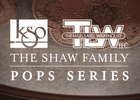Chat with the Conductor – Part II
Get to know conductor, coffee drinker and crossword puzzle enthusiast Aram Demirjian in this Q&A post, Part II of II. Read Part I here.
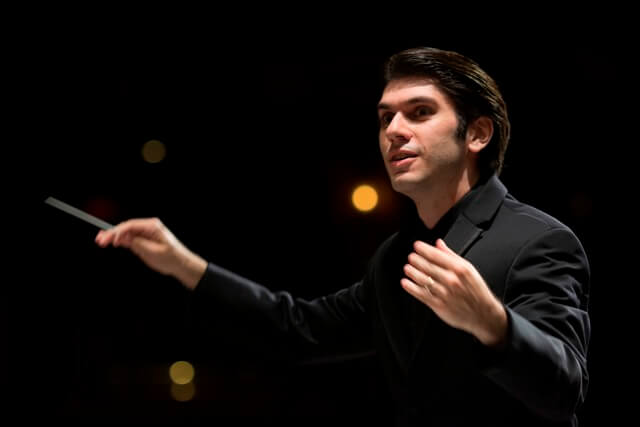
1. Can you briefly describe what made you *sure* you wanted to pursue music as a career? What, if anything, bolstered that decision?
I remember I was walking home in college from a government class that I hadn’t enjoyed very much, and even as I was replaying the less than enjoyable class in my head, my mind became preoccupied with planning the rehearsal I was going to conduct that night with an orchestra on campus. I realized at that moment that while with everything else I was doing, I didn’t quite feel like I belonged and often lost my patience. With conducting, however, I could never get enough, and somehow it just felt like what I was “supposed” to be doing.
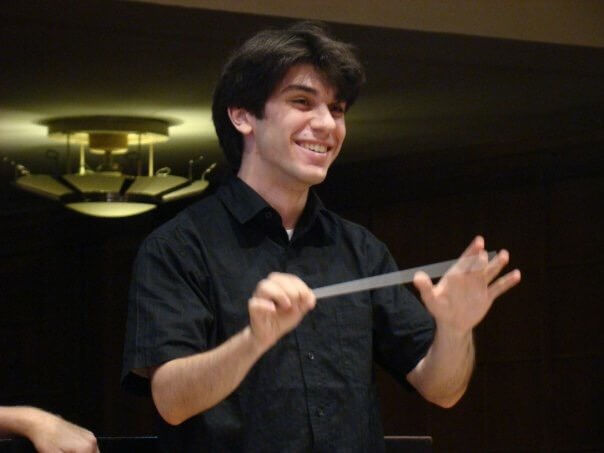
That said — it’s very difficult to make it in the musical profession, so I think most performers are always checking in with whether they are “sure” in what they are doing. There’s no true standard in art for what is “good” to measure your progress. To bring the most to your art, you really have to have conviction in yourself, because sometimes that is all that will sustain you after you lose an audition, or have a sub-par performance, or have times when it feels like no one else believes in you. I am fortunate to have a number of moments on my own musical journey that bolstered my security that I am “doing the right thing” — some are particularly memorable performances, some are professional milestones, and others are private moments where it is just me and whatever score I am working on, and I am overwhelmed by how much I love this art form. All performers need those moments to sustain them.
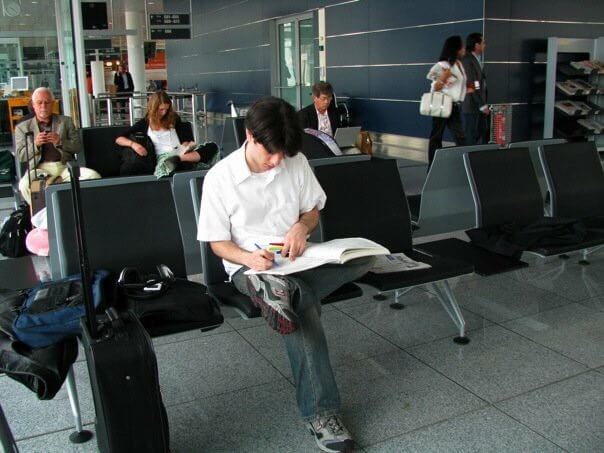
2. Talk about how “small” the music world is, and perhaps 1-2 collaborations you’re particularly looking forward to (or that we’ve already done).
The classical music world is very small, and you’re generally never more than 2 or 3 degrees of separation from anyone else. In the professional music world, we’ve all generally earned multiple degrees at the same small group of institutions, so many of us have teachers or classmates in common. People wear multiple hats — we are almost all simultaneously performers, teachers and students, and the result is you form relationships in all of these contexts at an exponential rate, but among a relatively small community of people. On top of which, during the summers, the music world retreats to music festivals in remote locations where you have the chance to interact, perform and study with people whom you do not necessarily spend the regular season near. So it is very likely that when you meet someone in the music world, you have a mutual friend or colleague, or perhaps someone even knows you by reputation. Like in any field, it’s very important to always perform at your highest level and to be a good colleague. Beyond it just being a good way to live, word also travels fast in the music world, good and bad!
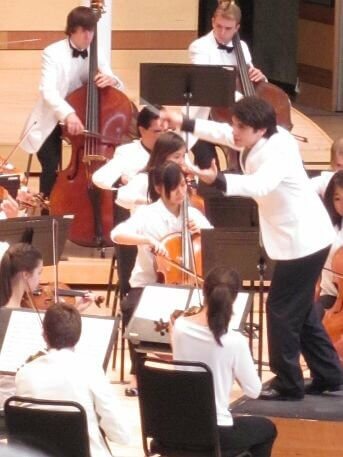
I’m always running into people in the music world in different contexts — sometimes it is circumstantial and sometimes it is by design. For example: our soloist for Rachmaninoff’s Second Piano Concerto earlier this year was Joyce Yang. I first became aware of Joyce by seeing her perform at the Aspen Music Festival, where I was a member of the conducting program. She and I didn’t meet, however, until I assisted on a program she did with the Kansas City Symphony, where I was associate conductor at the time. We hit it off, so when it came time for me to conduct my first Classical Series concert in Kansas City, they decided to have her be the soloist (on Rachmaninoff 3, incidentally). It was a great experience, so once I started in Knoxville as music director, I knew she was someone I wanted to invite. In the meantime, over the summer, about a month before Joyce’s KSO concert, I was visiting friends in Aspen, and posted about it on Facebook. Who do I get a text from, but Joyce Yang, who happened to be in Aspen at the same time! So we got to hang out a month earlier than expected.
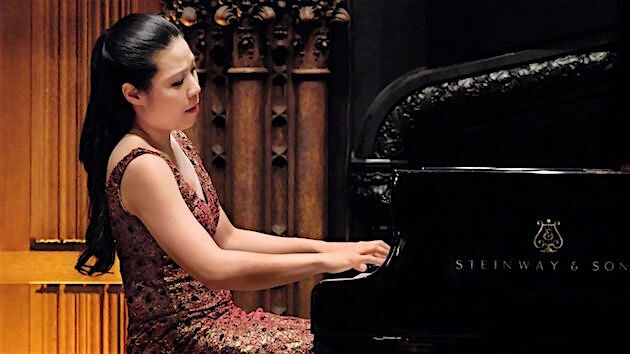
In case you missed it, here is Aram and Joyce during a Knoxville rendition of Conductor Carpool Karaoke from September 2018- well worth the watch!
And I have similar stories for almost every artistic relationship I have. You might notice that when I introduce our guest artists, more often than not I lead with, “my dear friend.” That’s not by accident — most of the people we invite to Knoxville are here because I or somebody in our organization knows them or has worked with them before and had a phenomenal experience. Music, like so many professions, is built partially on talent and ability, but also largely on human relationships, so I always advise young musicians keep up with everyone they meet on their musical journey. The more people you know, the more energy it takes, but it’s ultimately to everyone’s gain.
3. What, besides music, are you passionate about? What do you enjoy doing when you’re not performing or studying music?
I am a big sports fan. Growing up in the Boston area, as I did, sports are such an essential part of the culture that it is hard not to get swept up in the fervor of it, and I became an obsessive devotee of the Red Sox, Patriots and Celtics from a very young age. While I don’t have the time to watch every. single. game. like I did when I was a teenager, I still keep close track of what they are doing and catch games when I can. Luckily, Boston is not a big college sports town, so I didn’t have any pre-existing allegiances when I got to Knoxville.
(In other words: Go Vols!)
I also take every opportunity I can to read books — either novels or history, particularly American history. One thing many people don’t know about me is that original my plan was to go into politics, and in fact I have an undergraduate degree in Government. That stems from my interest in the history of our country and how it informs our present, which is an area I have tried to explore a little bit in my programming with the Symphony.
My one daily hobby is doing the New York Times crossword. (Or at least starting it…!)
4. Are there any famous classical musicians with whom you have a personal connection?
One thing about the musical profession: if you’re in it for long enough, you generally have some type of Yo-Yo Ma story, and that’s mostly the result of Yo-Yo’s ability to form true connections with just about everyone he interacts with. I’ve always said, if we could all be 15% more like Yo-Yo Ma, classical music would be the most of popular of musical genres without question.
My particular Yo-Yo Ma connection goes back to my elementary school days — I was in the same 3rd grade class as Yo-Yo’s daughter, Emily, and I had just started playing the cello. Yo-Yo was a chaperone on a school field trip we were taking, and I have a distinct memory of sitting next to him on the bus (all of 8 years old, and having just started lessons six weeks prior), having a conversation with him about how I was playing the cello. He was talking to me like we were on a level playing field, asking me what pieces I was playing and how I liked the instrument. And this wasn’t the only such interaction I had with him during my grade school years. As an adult, those interactions have left a profound impression on me: Yo-Yo is the most famous classical musician in the world, yet in every conversation he has, he makes it about the other person, putting his full energy into understanding them and getting them to express what they are feeling, especially with young people. I’ve always tried to follow that example in every step of my career, and he remains an incredible role model to live up to.
Here is Yo-Yo Ma performing J.S. Bach’s Prelude from Suite No. 1 for solo cello for an NPR Music Tiny Desk Concert for your listening pleasure.

